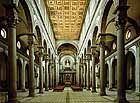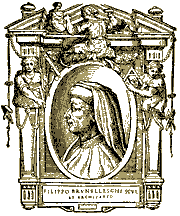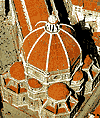Sculptor and architect
Florence 1377 - 1446
He is famous for the daring and original ideas behind his projects (such
as the Cupola of the Duomo in Florence) and
for the way in which he harmoniously re-elaborated the forms of classical
architecture according to the new spirit of his age.
He was trained as a sculptor and goldsmith in one of the typical Florentine workshops.
In 1401 he made himself known by winning the competition for the second door
of Baptistery "ex aequo" with Lorenzo Ghiberti, who was in fact commissioned
to carry out the work. The panels of the Sacrifice of Isaac that the two artists
carried out for the competition can be seen in the Bargello Museum. Brunelleschi
probably spent the next three years in Rome studying sculpture and architecture
with his friend Donatello. He joined the Guild of Goldsmiths in 1401 but his
interest in mathematics (he was a friend of Paolo dal Pozzo Toscanelli) and the
study of ancient monuments tended to turn his work more and more in the direction
of architecture.
From 1409 onwards, he worked on the construction of Santa Maria del Fiore and was immediately attracted by the problem of the cupola; his design won the competition in 1418 and in 1423 he was put in complete charge of the building works. The completion of this important construction, carried out with a special technique that made it possible to create the curves of the huge cupola without a supporting framework, took most of his life and formed the basis of Renaissance architecture. The main structure was finished by 1434 and then completed by the lantern in 1436 and the four tribunes in the apse in 1438.

Crucifix in
St. Maria
Novella
During this period Brunelleschi also worked on the Spedale degli Innocenti (1421-24), the Old Sacristy at San Lorenzo (1428), the reconstruction of San Lorenzo (1423 ca.), the Pazzi Chapel in the Cloisters of Santa Croce (1430), and on the design for Santo Spirito (1436), completely renewing the appearance of the medieval city.

The
centre nave in St. Lorenzo
His architectural works include the Ponte a Mare at Pisa, Palazzo di Parte Guelfa (1425) and the unfinished Rotonda degli Angeli (1434) in Florence. Today there is some discussion as to whether Brunelleschi really carried out the original designs for the Pitti Palace. When he died he was buried in Santa Maria del Fiore though his tomb, unknown for centuries, was not discovered until 1972.


